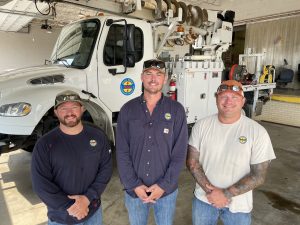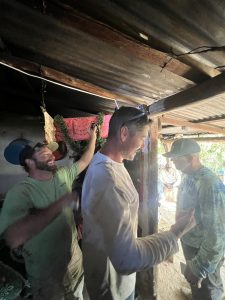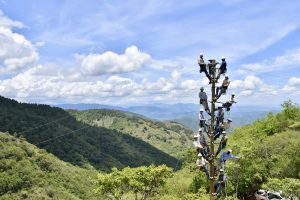In the remote Guatemalan villages of Corral Viejo and La Paz, families once relied on small solar generators to power a fan, a blender, or a tiny TV — only for minutes at a time. That changed when 15 volunteer linemen from seven Tennessee electric cooperatives, including Duck River Electric Membership Corporation’s (DREMC) Lucas Burk, Chase Cares and Cody McIlwain, arrived with a mission: to bring electricity, hope and lasting change.
Electrification projects like this are made possible by collaborative efforts through the National Rural Electric Cooperative Association, the national trade association that represents America’s nearly 900 local electric cooperatives, including DREMC. More than 300 NRECA-member cooperatives contribute time, money and materials to dozens of rural communities served by NRECA International projects. Scores of co-op directors, linemen, engineers, managers and other employees spend weeks of their time every year serving as volunteers in countries like Haiti, Guatemala, Costa Rica, Bolivia, the Philippines, South Sudan, and Uganda. They work with partner communities to expand electric access and build human capacity through a wide variety of volunteer assignments.
Over 17 days, the linemen, working alongside members of the local municipality, built 8 miles of electric line, set 34 poles by hand and connected 28 homes, two schools and one small business. The work was grueling: poles weighing up to 800 pounds were hauled by hand up steep trails, equipment was carried on dirt bikes, and holes were dug with hand tools instead of machinery. Yet every obstacle was met with determination, teamwork and grit.
“At first, communication wasn’t easy,” said Cares, a native of Bedford County who currently works at DREMC’s Lynchburg office. “We relied on translators, hand signals and a lot of pointing. But after a while, we could pretty well understand each other.”
The villagers matched the linemen’s effort. Local utility workers, 25 strong, carried nine 35-foot poles down a slope so steep it barely resembled a goat path. Supplies were scarce, forcing the team to rely on resourcefulness and improvisation.
But the reward was unforgettable. “Turning the lights on for the first time in these homes was a different kind of rewarding,” said McIlwain, a lineman at DREMC’s Chapel Hill office. “We have no idea how blessed we are.”
One woman, who previously could only use her blender for 30 seconds at a time, cried when she realized she could now run it whenever she wanted. Burk, a Bedford County native and lineman at DREMC’s Shelbyville office, described how the children followed them from house to house, eager to help by handing the linemen tools and learning every step of the process. Evenings often ended with friendly games of soccer between the barefoot children and the Tennessee volunteers.
The DREMC linemen were overwhelmed by the appreciation from the villagers. “Many of them shook our hands over and over again,” said Burk.
The cultural exchange extended to meals. Local cook Bianca prepared food ranging from familiar American dishes to Guatemalan specialties like fried plantains, fresh orange juice and – eventually, at the end of their stay – the linemen braved local delicacies like chicharrónes (or fried pork belly).
Burk joked that they were “all in” on the local experience, asking for fruit, ice, and anything else they hadn’t yet tried.
Though the work left the team with bug bites, sore muscles and memories of long drives across rugged terrain, the experience transformed everyone involved. “It was like stepping back into the past,” McIlwain said. “But the people smiled as if they had everything.”
When asked if they would do it again, all three Duck River Electric linemen answered with an enthusiastic yes. “Do we get first dibs?” Burk laughed.
This was the first all-Tennessee team to participate in the international electrification program, which has been bringing power to underserved communities since 1962. For the people of Corral Viejo and La Paz, electricity has brought dignity, opportunity, and a brighter future. For the linemen, the trip was a reminder that service is about more than wires and poles — it’s about connection, resilience and the power to change lives.




